Lalit K Jha in Washington
Observing that Pakistan may be making too much noise of a "modest" Indian presence in Afghanistan, former National Security Advisor James Jones said Prime Minister Singh has been "visionary" in taking political risks to defuse tense situations and Pakistanis need to "seize this moment".
"I think India has done quite a bit to relieve the fear that there might be an Indian attack. I think the prime minister has been visionary and taken political risk in India to do this," he said.
"We've had some benefits in the sense that Pakistan has been able to take some of its forces off the Indian border and bring it over to the west," General (rtd) Jones told US Senators at a Congressional hearing on Pakistan.
'Pak reluctant to respond to India's friendly gestures'
Image: Supporters of the banned Jamaat-ud-Dawa weep while taking part in a symbolic funeral prayer for Osama bin Laden in KarachiPhotographs: Athar Hussain/Reuters
Jones, who was Obama's national security advisor for nearly two years, said that for Pakistanis even a single Indian in Afghanistan can be too much.
"If the Pakistanis can seize this moment and we can pivot in a new direction with more clarity, more precision and more accountability, then something good might come of this. But it's going to be difficult," he said.
Jones said it will take "political courage and military support of that political courage" to recognise that there is a better way with regard to India. "But so far they have been extremely reluctant and in some cases resistant to grasping that opportunity," he said.
Responding to a question from Senator Chris Coons, Jones said the Indian presence in Afghanistan is modest. "But from the way I've come to understand Pakistan's view with regard to India, one Indian would be too much in Afghanistan. So there's no way to satisfy that, except to continue to be a good interlocutor between India and Pakistan," he observed.
'Pak reluctant to respond to India's friendly gestures'
Image: Smoke billows from the Taj Mahal hotel during the 26/11 terror attackPhotographs: Rediff Archives
Senator Richard Lugar, ranking Republican of the committee, said India-Pakistan relationship is clearly at the heart of the problem. The Obama administration, Jones said, has tried to play an indirect role in defusing tensions and carrying messages back and forth, and encouraging foreign ministers to meet.
"I think the Indian prime minister deserves a lot of credit for taking a political risk in his own country to show a more reasonable side in terms of this issue, by working to defuse tensions along the border. He showed great restraint after the Mumbai attack," he said.
Jones said the situation in region presents some unique challenges, but it also provides unique opportunities.
'Pak reluctant to respond to India's friendly gestures'
Image: People wade through flood waters in SindhPhotographs: Irfan Mufti
"I think that this is one problem that the Pakistanis will have to think very hard about as they decide how they want to play in this regional situation that they find themselves in the centre of on both sides. India, he observed, stepped up during the floods and offered $25 million worth aid "and would have done more if they'd been properly thanked and there had been a reciprocal gesture of goodwill".
Senator John Kerry, chairman of the Senate Foreign Relations Committee, who has just returned from Islamabad, said Pakistan is careful to not overcommit to doing anything in Afghanistan, because of the India factor.
"Unfortunately, their concern with India has something to do with Afghanistan. If you're looking at it a little bit through their eyes, you're a bit worried perhaps that you have India to their east, Afghanistan to the West.
'Pak reluctant to respond to India's friendly gestures'
Image: A soldier is assisted past his burning armoured vehicle after it struck an IED in Arghandab Valley, AfghanistanPhotographs: Bob Strong/Reuters
"And an Indian presence in Afghanistan just incites their fears for the long-term future," he said. Jones said in 2009, when Obama assumed the presidency and turned his attention to the region, the US opted to consider more of a strategic approach.
"Instead of dealing with the three countries -- India, Pakistan and Afghanistan -- separately, it became clear that increasingly we couldn't talk about Afghanistan without talking about Pakistan and vice-versa, simply because of the border and the safe havens," he said.
"We adopted and, I thought, did a pretty good job in consulting with both the civilian and military leadership in all three countries, to include India.
"We put together the elements of a long-term strategic partnership plan with all three countries. We emphasised in this partnership that there would be three main pillars to it: the security pillar, an economic pillar, and governance and rule of law pillar, particularly for Afghanistan and Pakistan," he said.
'Pak reluctant to respond to India's friendly gestures'
Image: US President Barack ObamaPhotographs: Jason Reed/Reuters
He said among the goals laid out for the region was for Pakistan to shun terrorism.
"For Pakistan, it was, from our viewpoint, a fairly straightforward request of renouncing terrorism as an instrument of foreign policy and to be able to show a willingness to move, in due time and within means and capabilities, against other safe havens and terrorist networks in their country," he said.
He noted that the Obama administration has spent a lot of time trying to help the India-Pakistan relationship following the Mumbai attack.
"Obviously we were very concerned that another attack might happen, and in that scenario, particularly on Indian soil, it would be very difficult to control India's reaction," he said.

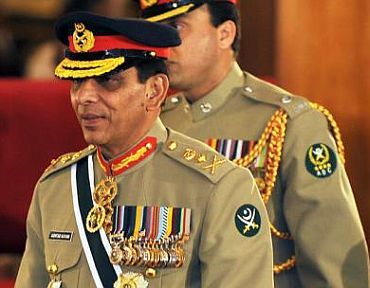
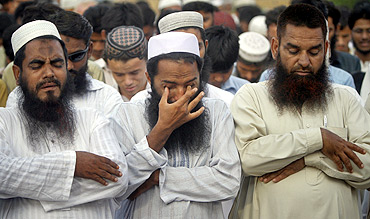
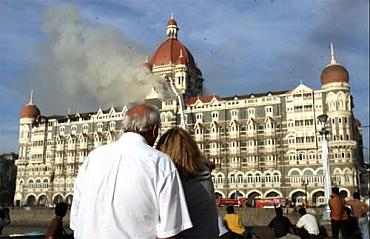
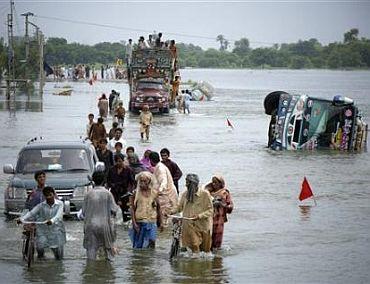
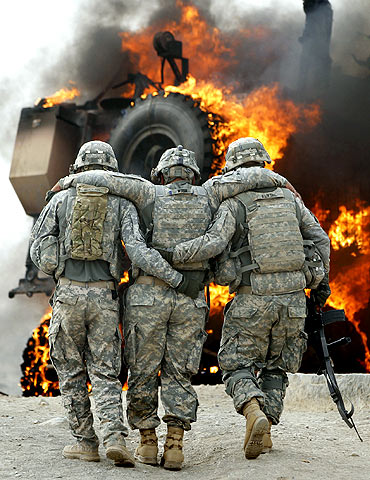
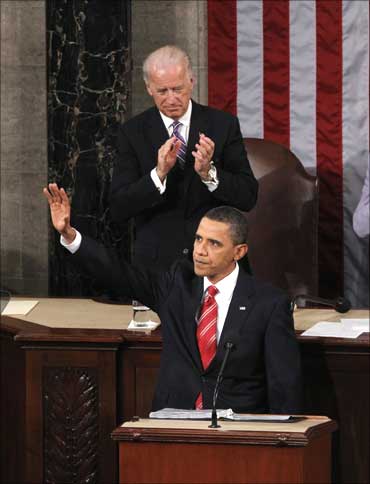
article